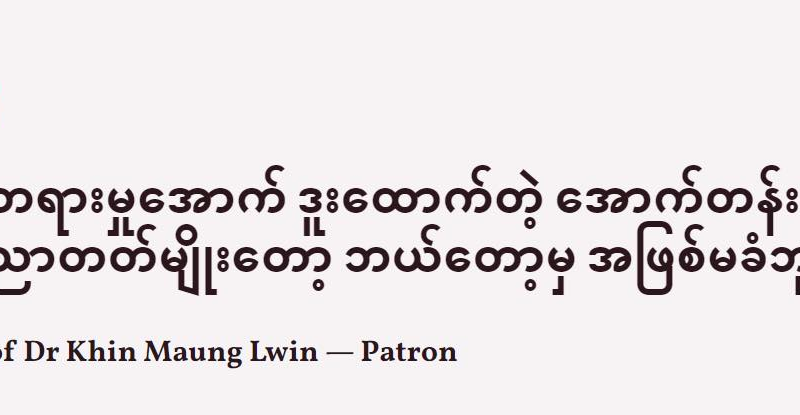Summary of News
- Union Minister U Tin Tun Naing says Spring Revolution involves not only armed struggle but also financial and diplomatic warfare
- Loikaw Prison unable to provide nutritious food, inmates left with only rice, fish paste, and rough salt, leading to malnutrition and illness
- New Mon State Party-Anti Dictatorship (NMSP-AD) announces retention of public service employees within their controlled territory; Warns against supporting military junta
- Successful screenings of “The Broken Dreams” and “Daring Flowers” held at The Comedy Store in central London
1. Union Minister U Tin Tun Naing says Spring Revolution involves not only armed struggle but also financial and diplomatic warfare

Union Minister U Tin Tun Naing emphasised that the Spring Revolution encompasses not only an armed struggle but also significant battles on financial and diplomatic fronts. The Union Minister made these remarks during a town hall meeting with the Myanmar community in South Korea on May 19.
He stated, “The warfront of the ongoing revolution extends beyond just armed conflict; it includes financial and diplomatic fronts as well. Regardless of how much we inform the international community about the unfairness, they might still acknowledge it. Min Aung Hlaing is planning to hold elections, likely after July 2025, which will undoubtedly be unfair. Yet, some countries with favourable relations with him will recognise the elections regardless of their fairness. We must always anticipate the enemy’s moves. The financial sector plays a crucial role as it is the source of the enemy’s funding.” Union Minister U Tin Tun Naing highlighted that the revolution against the military junta can be fought in various ways: physically, verbally, and mentally. He emphasised the success of the campaign to boycott Myanmar Beer, which funds the military junta, noting that it significantly impacted the junta by decreasing the sales of Myanmar Beer
2. Loikaw Prison unable to provide nutritious food, inmates left with only rice, fish paste, and rough salt, leading to malnutrition and illness
The Political Prisoner Network-Myanmar (PPNM) reported on May 20 that Loikaw Prison in Karenni State is no longer able to provide nutritious food to inmates, resulting in severe malnutrition and disease among prisoners.
While even the military junta forces stationed inside the prison have to conserve food amidst the ongoing escalation of battles, the Loikaw Prison authorities have reduced the prisoners’ standard rations of rice, pea curry, and four pieces of meat per week to just rice, fish paste, and coarse salt. This drastic change in diet has led to widespread malnutrition among inmates, including political prisoners. An increasing number of inmates in Loikaw Prison reportedly suffer from weakened bodies, with some experiencing lower body paralysis due to malnutrition caused by insufficient nutritious food for more than six months, coupled with restrictions on unlock time and physical activities, according to PPNM. The organisation stated that if prisoners continue to suffer from food deprivation for an extended period, those with poor health could face the risk of dying at any time due to a lack of nutrition.
3. New Mon State Party-Anti Dictatorship (NMSP-AD) announces retention of public service employees within their controlled territory; Warns against supporting military junta
The New Mon State Party-Anti Dictatorship (NMSP-AD) announced that they will retain public service employees within their controlled territory who previously served under the military junta, provided they fulfil their responsibilities and do not act as supporters of the junta. Nai Banyar Mon, spokesperson of the NMSP-AD, stated this during an interview with the Maun regarding an online meeting marking three months since the founding of the NMSP-AD. The meeting, held on May 19, reviewed political and warfare activities over the past three months and was attended by 30 Mon organisations from both home and abroad, including Mon monks and other distinguished guests.
The NMSP-AD declared its split from the New Mon State Party (NMSP) on February 14, vowing to fight military dictatorship and cooperate with other revolutionary forces. Since then, it has allied with various revolutionary groups and conducted operations against the military junta.
4. Successful screenings of “The Broken Dreams” and “Daring Flowers” held at The Comedy Store in central London
Screenings of “The Broken Dreams” and “Daring Flowers” films to raise revolutionary funds were successfully held at The Comedy Store cinema in central London on May 18. The Myanmar community in the UK came out to support the screenings, and Dr. Thet Ko Ko, Representative of the National Unity Government (NUG) in the UK, warmly received them and engaged in cordial discussions.

“The Broken Dreams” and “Daring Flowers” films have been screening in various countries to raise revolutionary funds.
Military News
5. Defence Minister attributes military successes and territorial gains in central upper Myanmar to close command of late No. 1 Military Regional Commander and public participation
U Yee Mon, the Union Minister of Defence for the National Unity Government (NUG), attributed the military successes and territorial gains in Anyar (Central Upper Myanmar) to the strategic command of the late No. 1 Military Regional Commander, Du Kaba Hkawng Lum, and the participation of the public. He commended Lieutenant General Kawng Lum, stating, “As the commander of the No. 1 Military Region, he oversaw the entire northern part of Myanmar, which includes Sagaing, Mandalay, and Magway Regions. Today’s military success and territorial control did not just happen out of the blue but came about through the combination of the people’s participation and his strategies and close command. Hundreds of PDF (People’s Defence Force) battalions in the Anyar Region that he raised have now become reliable and effective.”
Additionally, U Yee Mon fondly remembered Du Kaba Hkawng Lum as a highly respected leader that he used to refer to him as “general” and noted his intelligence and compassionate nature.
Lieutenant General Ruhkyau Hkawng Lum, the Chief of Staff of the Kachin Independence Army (KIA) and commander of the No. 1 Military Region during the Spring Revolution, passed away at the age of 62 on May 13, 2024, at 6:23 p.m. due to illness.
6. Police private defects to Federal Revolution Force-Gangaw with weapons
On May 19, Federal Revolution Force-Gangaw (FRF-Gangaw) announced that a police private from Gangaw District Police Station defected to their ranks, bringing weapons with him. Kyaw Zin Tun, who had served in the police for five years, reportedly contacted Company 3 (Senthang Revolution Force-SRF) of the No. 2 Battalion of the FRF-Gangaw to defect. He arrived with 36 rounds of 7.62 ammunition and 22 rounds of 5.56 ammunition. Following his defection, he was relocated to a liberated area. FRF-Gangaw called on other police officers and soldiers still serving under the military junta to defect without delay.
7. PDF forces launch attack on military camp in a village school in Taungoo township, driving out junta forces and seizing weapons
The People’s Defence Force (PDF) Battalion No. 3501, known as the Ba Yint Naung Column, announced on May 19 that they recently conducted a raid on a military junta camp stationed within a school in Wet Hkauk Sein village, Taungoo township, Bago Region. During the attack, the military junta forces abandoned their fortified camp, which included bunkers. The PDF successfully confiscated 10 rounds of 60-mm artillery shells along with other military equipment from the site.
8. Approximately 5,000 Tanintharyi residents displaced by military junta’s air, naval, and ground assaults
According to a report from the Dawna Tanintharyi IDP support group, around 5,000 residents from four villages in Thayet Chaung township, Tanintharyi Region, have been displaced due to the military junta’s aerial, naval, and ground attacks.
Since May 8, the military junta forces have conducted coordinated offensives on Ka Net Thiri village, including aerial bombardments on nearby villages. As a result, residents from Ka Net Thiri and three nearby villages—Kyawe Min Kone, Kyauk Kha Mauk, and Ya Nge—were forced to flee their homes.
Additionally, residents from Pedet, Kyaukse, Padauk, Paytakhet, Sin Swal Chaung, Thayet Taung Kyi, Sin Ma Tan, and lower Thayet Chaung villages, who had previously been displaced when revolutionary forces captured the military junta’s camp in Pedet village, remain displaced, according to the IDP support group.
The total number of displaced persons within Thayet Chaung township has now reached approximately 8,000, with 5,000 among them in need of humanitarian aid.
9. Yinmabin coalition support group honours revolutionary comrades for defeating junta personnel and acquiring six firearms
The Support Group for the Yinmabin Coalition, the Union Liberation Front (ULF), represented by Amay Su Naing, awarded revolutionary comrades who defeated military junta personnel near No. 28 Aung Zeya police battalion hill in Yinmabin township, Sagaing Region, and secured six firearms. The award consisted of five hundred thousand kyats.
The joint revolutionary forces launched an attack on the police battalion at 6:30 p.m. on May 17, eliminating six military junta personnel and securing six firearms. The joint forces involved in the operation were the Yinmabin Dragon Brother Task Force (DBTF) and the Yinmabin Cho Mai Mai Group.
10 Yesagyo PDF successfully completes first mine training
The Yesagyo People’s Defence Force (PDF), also known as the No. 3 Battalion of the People’s Defence Force under Pakokku District, announced the successful completion of its first mine training program. This training was initiated due to the vital role improvised mines play in disrupting military junta communication routes and serving as security shields for revolutionary forces. Unfortunately, many revolutionary comrades have lost limbs and lives due to accidental explosions, primarily because of the lack of technology to produce modern safe mines, insufficient knowledge and skills, and lack of experience.
The training aimed to provide comprehensive knowledge about mines and enhance the skills of revolutionary comrades to serve the public effectively. The programme included participants from the Yesagyo PDF and local defence forces. Experienced instructors taught how to produce, trap, and remove mines, along with essential mine technologies. Comrades who completed the training will reportedly be assigned to a special mine unit. The training concluded with a graduation ceremony where outstanding trainees were rewarded.
#Credit : Radio NUG
#WhatsHappeningInMyanmar


